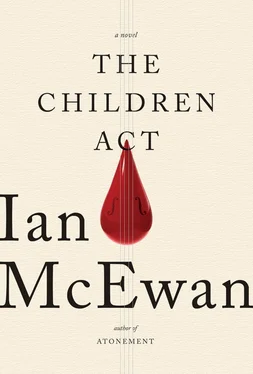“Dying, you mean! He knows nothing. This is one confused little puppy.”
Fiona said, “What does he say when you tell him that God wants him to live?”
“Nothing. He’s like, Why should I listen to her ?”
Just then, Marina opened the door, raised a hand and went back inside.
Fiona said, “Well, thank you.”
In response to a buzzer, the Filipina nurse was hurrying toward another door.
“You go in there, ma’m,” her friend said, “and please turn him around . He’s a lovely boy.”
If Fiona’s recollection of stepping into Adam Henry’s room was confused, it was because of the disorienting contrasts. There was much to take in. The place was in semidarkness but for the focused bright light around the bed. In a corner, Marina was just settling herself into a chair with a magazine whose print she could not possibly read in such gloom. The life-support and monitoring equipment around the bed, the high stands, their feed lines and the glowing screens emanated a watchful presence, almost a silence. But there was no silence, for the boy was already talking to her as she entered, the moment was unfurling, or erupting, without her and she was left behind in a daze. He was sitting upright, supported by pillows against a metal backrest, lit as though by a single spot in a theatrical production. Spread about him on the sheets and spilling out into the shadows were books, pamphlets, a violin bow, a laptop, headphones, orange peel, sweet wrappers, a box of tissues, a sock, a notebook and many lined pages covered in writing. Ordinary teenage squalor, familiar to her from family visits.
It was a long thin face, ghoulishly pale, but beautiful, with crescents of bruised purple fading delicately to white under the eyes, and full lips that appeared purplish too in the intense light. The eyes themselves looked violet and were huge. There was a mole high on one cheek, as artificial-looking as a painted beauty spot. His build was frail; his arms protruded like poles from the hospital gown. He spoke breathlessly, earnestly, and in those first few seconds she caught nothing. Then, as the door swung closed behind her with a pneumatic sigh, she gathered he was telling her how strange it was, he had known all along that she would visit him, that he thought he had this knack, this feel for the future, that they had read a poem at school in religious studies which said that the future, present and past were all one, and this was what the Bible said too. His chemistry teacher said relativity proved that time was an illusion. And if God, poetry and science all said the same thing, it had to be true, didn’t she think?
He fell back against the pillows to catch his breath. She had been standing at the foot of his bed. Now she approached the side where there was a plastic chair and said her name and put out her hand. His was cold and damp. She sat down and waited for him to say more. But his head was tilted back and he was looking at the ceiling, still recovering and, she realized, expecting an answer. She became aware of the hiss of one of the machines at her back, as well as a muted rapid bleeping, at the audible threshold, or at least hers. The heart monitor, turned down for the patient’s comfort, was betraying his excitement.
She leaned forward and said she thought he was right. In her experience in court, if different witnesses who had never spoken to each other all said the same thing about an event, it was more likely to be true.
Then she added, “But it’s not always. There can be group delusions. People who don’t know each other can be gripped by the same false idea. That certainly happens in courts of law.”
“Like when?”
He was still catching his breath, and even these two words were an effort. His gaze remained upward, away from her, while she thought of an example.
“Some years ago in this country children were taken away from their parents by the authorities, and the parents were prosecuted for what was called satanic abuse, for doing terrible things to their children in secret devil-worshipping rituals. Everyone piled in against the parents. Police, social workers, prosecutors, newspapers, even judges. But it turned out there was nothing. No secret rituals, no Satan, no abuse. Nothing had happened. It was a fantasy. All these experts and important people were sharing a delusion, a dream. Eventually, they all came to their senses and were very ashamed, or they should have been. And very slowly, the children were returned to their homes.”
Fiona talked as though she herself was in a dream. She felt pleasantly tranquil, even as she guessed that Marina, monitoring the conversation, would be baffled by her remarks. What was the judge doing, talking to the boy about child abuse, within minutes of meeting him? Was she wanting to suggest that religion, his religion, was a group delusion? Marina would have expected the significant opening remark, after some gentle small talk, to be along the lines of, I’m sure you know why I’m here. Instead, Fiona was free-associating, as though to a colleague, about a forgotten institutional scandal of the 1980s. But what Marina thought did not really trouble her. She would do this her own way.
Adam lay still, taking in what she had said. At last, he turned his head on the pillow and his eyes met hers. She had squandered enough gravitas already and was determined not to look away. His breathing was more or less under control; his look was dark and solemn, impossible to read. That didn’t matter, for she was feeling calmer than she had all day. No great claim. If not calm, then unhurried. The pressure of a waiting court, the necessity of a rapid decision, the consultant’s urgent prognosis were temporarily suspended in the penumbral air-sealed room as she watched the boy and waited for him to speak. She was right to have come.
To hold his gaze for longer than half a minute or so would have been improper, but she had time to imagine, in the condensing way of thought, what he saw in the chair by his bedside, another grown-up with a view, a grown-up further diminished by the special irrelevance that haunts an elderly lady.
He looked away just before saying, “The thing about Satan is that he’s amazingly sophisticated. He puts a stupid idea like satanic whatever, abuse, into people’s minds, then he lets it get disproved so everyone thinks that he doesn’t exist after all, and then he’s free to do his worst.”
Another feature of her unorthodox opening—she had strayed onto his ground. Satan was a lively character in the Witness construction of the world. He had come down to earth, so she had read in her skim through the background material, in October 1914 in preparation for the end days and was working his evil through governments, the Catholic Church and especially the United Nations, encouraging it to sow concord among nations just when they should be readying themselves for Armageddon.
“He’s free to try and kill you with leukemia?”
She wondered if she had spoken too directly, but he had an adolescent’s affected resilience. Toughing it out. “Yes. That sort of thing.”
“And you’re going to let him?”
He pushed himself against the backrest to sit up, then stroked his chin thoughtfully, in parody of a pompous professor or TV pundit. He was mocking her.
“Well, since you ask, I intend to crush him by obeying God’s commandments.”
“Is that a yes?”
He ignored this, waited a moment, then said, “Have you come to change my mind, straighten me out?”
“Absolutely not.”
“Oh yes! I think so!” He was suddenly the mischievous provoking child, hugging his knees through the bedcovers, though feebly, and he was excited again, working up a sardonic voice. “Please, miss, set me on the path of righteousness.”
Читать дальше












